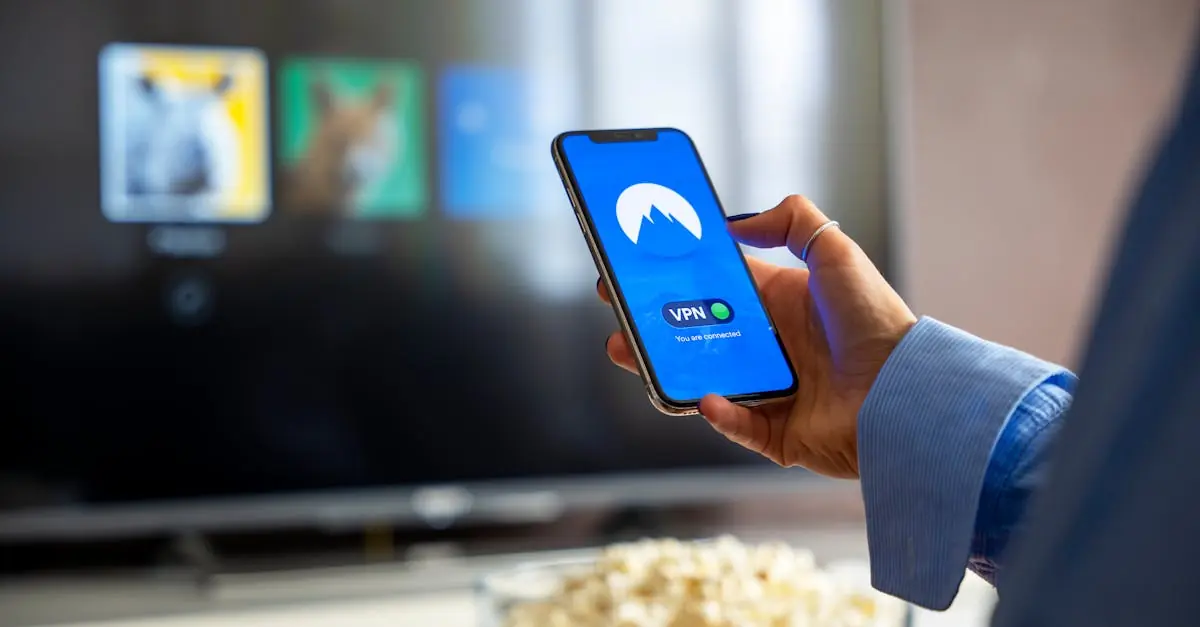Table of Contents
ToggleIn a world where phones are practically an extension of ourselves, keeping them secure is more crucial than ever. Imagine losing your phone and the panic that sets in when you think about all those embarrassing selfies and sensitive information just floating around. Fear not, mobile security apps are here to save the day—like superheroes for your smartphone.
These handy tools not only protect your data but also offer peace of mind. With features like remote locking, malware scanning, and even anti-theft measures, they’re like having a personal bodyguard in your pocket. So whether you’re a social media guru or a busy professional, investing in mobile security apps is a no-brainer. After all, who wouldn’t want to keep their digital life safe while enjoying the latest cat memes?
Overview of Mobile Security Apps
Mobile security apps protect personal information on smartphones. With the increasing use of mobile devices for sensitive tasks, these applications become vital.
Importance of Mobile Security
Mobile security plays a crucial role in safeguarding personal data. A survey by Statista in 2022 indicated that over 40% of users experienced security breaches, emphasizing the urgency for protective measures. Users frequently store banking details, passwords, and private communications on their devices, making them prime targets for cybercriminals. By employing mobile security apps, individuals can mitigate risks and maintain control over their information. Regular updates and patches from these apps ensure ongoing protection against evolving threats. Ultimately, investing in mobile security enhances confidence in using smartphones for various tasks.
Types of Threats Addressed
Numerous threats target mobile devices, highlighting the need for robust security. Malware acts as a significant risk, often infiltrating devices through downloads or malicious links. Phishing attacks aim to trick users into revealing sensitive information, exploiting social engineering tactics. Unauthorized access can expose personal accounts if devices lack sufficient security measures. Additionally, loss or theft of smartphones leads to potential data breaches, increasing the importance of remote locking features. Apps that offer comprehensive protection effectively confront these threats, providing tools such as real-time scanning and privacy monitoring. By addressing various threats, mobile security apps ensure a safer digital experience for users.
Key Features to Look For
When choosing a mobile security app, specific features can enhance protection and improve user experience. Consider the following essential aspects.
Privacy Protection
Privacy protection ranks high among user needs. Robust apps offer features that prevent unwanted access to personal data, such as sensitive messages or photos. Data encryption ensures information remains secure during transmission. Comprehensive permission settings help users control what information third-party applications can access. Regular updates also enhance privacy measures, addressing potential vulnerabilities that may arise.
Malware Detection
Malware detection serves as a critical feature in any mobile security app. Scanning for malicious software protects devices from threats that compromise data integrity. Real-time scanning capabilities allow for immediate detection of harmful applications or files. Regular database updates keep malware detection systems effective against new threats. Users gain peace of mind knowing their devices actively monitor and combat malware.
Device Tracking
Device tracking provides an essential safety net for lost or stolen phones. Many apps feature GPS tracking, allowing users to locate their devices quickly. Remote locking options enable users to secure their phone and protect sensitive data. In cases of theft, integrated notification systems can alert users of unauthorized access attempts. These capabilities empower users by providing essential tools for safeguarding their devices.
Top Mobile Security Apps Reviewed
Mobile security apps play a crucial role in safeguarding personal information. Various options exist, each offering unique features tailored for different needs.
App 1: Features and Benefits
App 1 stands out with its advanced malware detection capabilities. It provides real-time scanning, ensuring immediate identification of threats. Privacy protection also ranks high, with robust data encryption and customizable permission settings. Users benefit from device tracking, allowing them to locate lost smartphones quickly. The app includes remote locking features, securing personal information when a device goes missing. Based on user reviews, App 1 consistently ranks among the top choices for comprehensive mobile security.
App 2: Features and Benefits
With App 2, users gain access to a user-friendly interface designed for effortless navigation. Its proactive anti-theft measures enhance security, providing alerts for unauthorized access attempts. Regular updates keep the app equipped to handle emerging threats effectively. Additionally, it includes comprehensive privacy monitoring tools that keep track of data exposure. The backup feature adds another layer of security, enabling users to restore valuable data if lost. High-performance reviews affirm App 2’s effectiveness in protecting sensitive information.
App 3: Features and Benefits
App 3 prioritizes user convenience with seamless integration across multiple devices. Its powerful firewalls protect against unauthorized networks and phishing attacks. Regular malware updates help mitigate risks, ensuring consistent protection. Users appreciate the privacy audit feature, which assesses permissions and offers recommendations for improvement. Backup solutions safeguard important data, preventing loss from unforeseen incidents. Recognition from industry experts further highlights App 3 as a reliable choice among mobile security apps.
Best Practices for Using Mobile Security Apps
Using mobile security apps effectively requires adhering to specific best practices. These practices enhance the overall security of devices and the integrity of personal information.
Regular Updates
Regular updates are essential for maintaining mobile security apps. Cyber threats evolve constantly, which makes it critical to keep apps equipped with the latest security patches. Not only do updates improve functionality, but they also fix vulnerabilities that cybercriminals might exploit. The majority of mobile security apps provide automatic updates, ensuring users receive this protection without manual intervention. Users must also monitor their devices for any pending updates and install them promptly for optimal security.
User Awareness and Education
User awareness plays a vital role in the effectiveness of mobile security apps. Educating oneself about common threats like phishing attacks and malware enhances overall defense. Users should familiarize themselves with the app’s features for maximum benefit, understanding how to use them effectively. Engaging with reputable sources of information about mobile security helps users stay informed about potential risks. Informed users are less vulnerable to attacks and can recognize suspicious activity more readily, ultimately improving their overall mobile security posture.
Mobile security apps are no longer optional; they’re essential for anyone who values their personal information. With the increasing prevalence of cyber threats targeting smartphones, these apps provide a crucial layer of protection. Users can feel more secure knowing their data is safeguarded through features like real-time scanning and remote locking.
As technology evolves, so do the tactics of cybercriminals. Regular updates and user awareness are vital in staying one step ahead. By choosing the right mobile security app and implementing best practices, individuals can significantly enhance their digital safety. Investing in mobile security is a proactive step toward protecting one’s digital life in an increasingly connected world.





